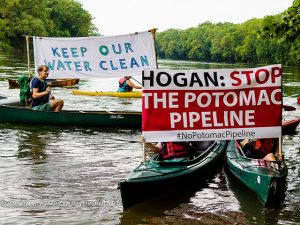The Montgomery County Council is calling on Maryland Governor Larry Hogan to reject the proposed TransCanada pipeline that would cut under the Potomac River just west of Hancock, Maryland.

Maryland’s Department of the Environment (MDE) has until March 15, 2018 to make a decision on TransCanada’s pipeline application.
“MDE must fully understand the scope of the impacts the pipeline will have on Maryland’s water quality before making a decision on the pipeline,” the County Council wrote to Hogan last week. “If this complete understanding cannot occur before March 15th, we strongly urge MDE to deny the permit while it asks for the necessary additional information from TransCanada. Ultimately, we believe that a thorough review of the pipeline’s impacts will leave your administration with no choice but to deny the permit.”
TransCanada’s proposed Eastern Panhandle Expansion Pipeline in western Maryland would carry fracked gas from Pennsylvania through Maryland and into West Virginia.
The pipeline would connect with another gas pipeline proposed by Mountaineer Gas, a West Virginia company.
Not only would the TransCanada pipeline cross the Potomac River, but both pipelines would cross dozens of rivers and streams that flow into the Potomac River.
“Although Maryland’s authority is centered on the TransCanada portion of this pipeline, both pipelines pose a severe risk to Marylanders,” the council members wrote to Hogan.
“There are inherent risks with the construction of pipelines and the methods used to route them across rivers and waterways, from stormwater pollution to massive spills during the Hydraulic Directional Drilling method called a blowout,” the council wrote. “A blowout spill at the Potomac River crossing on the TransCanada pipeline immediately threatens the Washington County, Maryland and the Berkeley County, West Virginia public water system for over 100,000 people. Similarly, if a blowout were to occur with the Mountaineer Gas portion of the pipeline, which crosses three major tributaries to the Potomac, the same public and private water systems would be threatened.”
“The route proposed for both pipelines would also cross sensitive limestone geology called karst. Karst geology allows pollution to quickly flow through the ground and into aquifers that supply drinking water to private and public water systems,” the council wrote. “Karst geology can increase the risks of a blowout spill during hydraulic directional drilling and pose a long term risk to drinking water from pipeline leaks or breaks after construction.”
“The karst geology in Western Maryland and West Virginia’s Eastern Panhandle continues to plague private water systems with increased bacteria levels sourced from farms and septic systems. Karst has also been responsible for localized private well water contamination from leaking gas station tanks. Karst can easily and quickly transmit pollution great distances. The threat to Maryland’s water is not just during the construction phase, but for the life of the pipeline.”
To move forward, Governor Hogan needs to grant TransCanada a permit under Section 401 of the Clean Water Act.
“This water quality certification process is meant to ensure that the proposed pipeline will not threaten or degrade Maryland’s water quality,” the council wrote. “This process gives the MDE a critical opportunity to assess the potential impacts of a federal project on the state’s water resources. MDE has an obligation to conduct a thorough and rigorous review of the project’s impacts. It must consider each individual waterbody crossing, up- and down-stream erosion and sediment issues, karst-related threats, and other impacts to water quality. As of now, TransCanada has not provided sufficient information about the entire pipeline project, including the related Mountaineer Gas pipeline, to state or federal regulators.”
